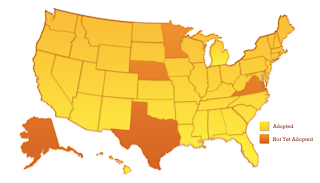 "Reports fuel graduation rate debate: State puts priority on getting students through high school," by Diette Courrege, the Post and Courier, June 21, 2006.
"Reports fuel graduation rate debate: State puts priority on getting students through high school," by Diette Courrege, the Post and Courier, June 21, 2006.This banner headline appeared in Wednesday's Local and State section above the fold.
Now Guess: how many paragraphs does the reader need to wade through to get to the "reports."
Well, we know from paragraph 2 that they are "independent,"but it takes NINE more (and shuffling to page 5B with the Obituaries) to find out what the reports said! Those intervening paragraphs essentially lay out the state Superintendent's arguments that the "reports" should be dismissed.
Is it my overactive imagination, or is the reporter an apologist for the Superintendent?
But...Surprise! Surprise! The "debate" is NOT about how South Carolina underreported its graduates. No, shocking as it may seem, South Carolina underreported its dropouts! Whereas SC reported last year that ONLY 25 percent of its students were not graduating, that figure turns out to be more like 40 to 47 percent. For Charleston County the dropout rate (let's call it by its name) is 54 percent.
I'm not making these statistics up for dramatic effect. They're real.
Charleston County's Academic Officer "said she didn't want to argue about where the state or school district ranked." She characterized the rankings as being "in the bottom half." How about the bottom ONE PERCENT? A mathematical reality check here.
If the
Post and Courier took itself seriously in reporting NEWS, a banner headline on the FRONT page would have read,
"Future looks dim for Charleston County: More than half our children drop out." What do you think would have been the reaction if it had?
By the way, the reports came from Education Week, a national educational publication, and from the U.S.Department of Education.
And what were the Superintendent's points? Her ace-in-the-hole is that SC requires 24 credits for a diploma, "3.5 more credits than the national average." As Tenenbaum says, "'You can imagine how [states with lower totals] rates are going to be higher. We're proud that a high school diploma in SC means something.'"
As opposed to one from New Jersey, the state rated first? This is such a specious argument that I hardly know where to begin, but I'll try.
- Everyone agrees that most dropouts occur on the ninth-grade level. You mean, a 14-year-old looks at the requirements and says to himself, "Wow, I can't get more than 20 credits [the national average], so I might as well drop out now."
- The number of credits required does not affect the dropout rate in any meaningful sense. That would be only for high school seniors who do not pass enough courses to get the diploma and do not go to summer school.
- The total of credits does not reveal how difficult the courses are to pass, nor does it reveal what core requirements are included. Apples and oranges again.
- Tenenbaum does not seem to know that the lower total credits number does not reflect requirements added by local districts in states where local districts have more control. Case in point: Wyoming ( which along with California and Wisconsin) requires 13 credits to graduate. The Wyoming deputy state superintendent of public instruction "said the report is misleading because...each district imposes an additional 12 to 15 credits." That means Wyoming's graduates have earned MORE credits than SC's, while the state ranks 22nd instead of last and has a gap of only 3 percentage points between its own calculated graduation rate and that of the report. SC's gap was more like 20 to 25 percentage points.
- New Jersey, the highest-ranked state, also requires more credits than the national average, 22 on the state level. Surely Supt. Tenenbaum does not suggest that those two credits make up the difference between first and last places? And, since I have lived and taught in New Jersey, I know that many districts do the same as those in Wyoming--add additional requirements.
- Being fifty-first out of 50 states means that all of the usual suspects--the District of Columbia included--are doing a better job. Back in the dark ages, when I was in high school in Charleston County, at least we could count on Mississippi or Georgia to be worse off! No more.
- Blaming the community is no excuse. Calls for "collective ownership" of the dropout rate will go unheeded as long as bureaucrats gloss over the problem and newspapers bury embarrassing statistics with the obituaries. New Jersey has Newark, Elizabeth, and Camden--big cities with big problems, not exactly garden spots of the Garden State in any way. It also copes with more immigrants speaking more languages than the average person can list, not merely Spanish. It's first. Seriously, how many people think that "the community should be empowered and assume some responsibility...when they see a 13-year-old in the mall" that should be in school? Are truancy laws enforced? Are parents held accountable?
No true progress will be made as long as we pretend the elephant is the size of a mosquito.











